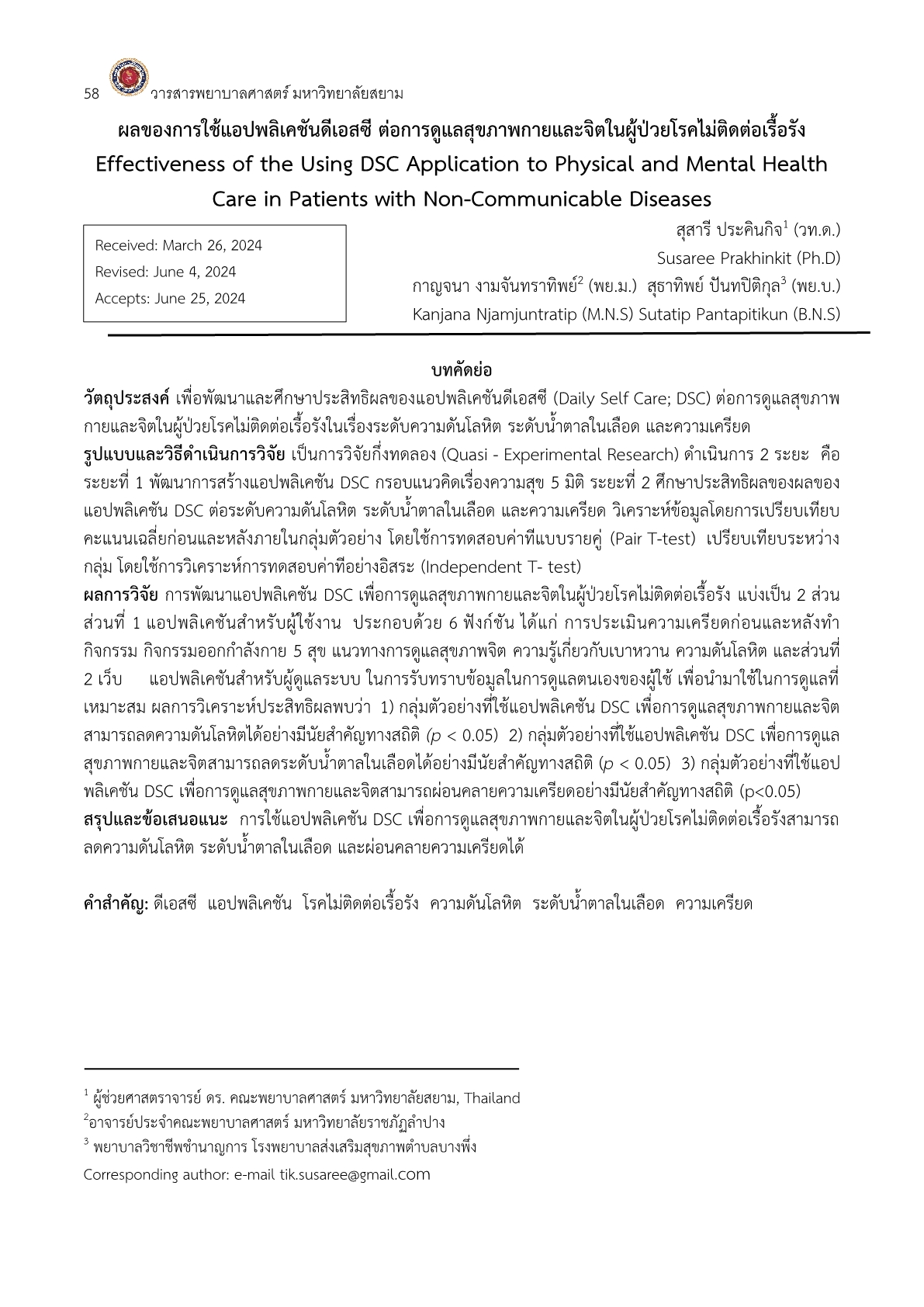ผลของการใช้แอปพลิเคชันดีเอสซี ต่อการดูแลสุขภาพกายและจิตในผู้ป่วยโรคไม่ติดต่อเรื้อรัง
คำสำคัญ:
ดีเอสซี แอปพลิเคชัน , โรคไม่ติดต่อเรื้อรัง , ความดันโลหิต , ระดับน้ำตาลในเลือด , ความเครียดบทคัดย่อ
วัตถุประสงค์ เพื่อพัฒนาและศึกษาประสิทธิผลของแอปพลิเคชันดีเอสซี (Daily Self Care; DSC) ต่อการดูแลสุขภาพกายและจิตในผู้ป่วยโรคไม่ติดต่อเรื้อรังในเรื่องระดับความดันโลหิต ระดับน้ำตาลในเลือด และความเครียด
รูปแบบและวิธีดำเนินการวิจัย เป็นการวิจัยกึ่งทดลอง (Quasi - Experimental Research) ดำเนินการ 2 ระยะ คือ ระยะที่ 1 พัฒนาการสร้างแอปพลิเคชัน DSC กรอบแนวคิดเรื่องความสุข 5 มิติ ระยะที่ 2 ศึกษาประสิทธิผลของผลของแอปพลิเคชัน DSC ต่อระดับความดันโลหิต ระดับน้ำตาลในเลือด และความเครียด วิเคราะห์ข้อมูลโดยการเปรียบเทียบคะแนนเฉลี่ยก่อนและหลังภายในกลุ่มตัวอย่าง โดยใช้การทดสอบค่าทีแบบรายคู่ (Pair T-test) เปรียบเทียบระหว่างกลุ่ม โดยใช้การวิเคราะห์การทดสอบค่าทีอย่างอิสระ (Independent T- test)
ผลการวิจัย การพัฒนาแอปพลิเคชัน DSC เพื่อการดูแลสุขภาพกายและจิตในผู้ป่วยโรคไม่ติดต่อเรื้อรัง แบ่งเป็น 2 ส่วน ส่วนที่ 1 แอปพลิเคชันสำหรับผู้ใช้งาน ประกอบด้วย 6 ฟังก์ชัน ได้แก่ การประเมินความเครียดก่อนและหลังทำกิจกรรม กิจกรรมออกกำลังกาย 5 สุข แนวทางการดูแลสุขภาพจิต ความรู้เกี่ยวกับเบาหวาน ความดันโลหิต และส่วนที่ 2 เว็บ แอปพลิเคชันสำหรับผู้ดูแลระบบ ในการรับทราบข้อมูลในการดูแลตนเองของผู้ใช้ เพื่อนำมาใช้ในการดูแลที่เหมาะสม ผลการวิเคราะห์ประสิทธิผลพบว่า 1) กลุ่มตัวอย่างที่ใช้แอปพลิเคชัน DSC เพื่อการดูแลสุขภาพกายและจิตสามารถลดความดันโลหิตได้อย่างมีนัยสำคัญทางสถิติ (p < 0.05) 2) กลุ่มตัวอย่างที่ใช้แอปพลิเคชัน DSC เพื่อการดูแลสุขภาพกายและจิตสามารถลดระดับน้ำตาลในเลือดได้อย่างมีนัยสำคัญทางสถิติ (p < 0.05) 3) กลุ่มตัวอย่างที่ใช้แอปพลิเคชัน DSC เพื่อการดูแลสุขภาพกายและจิตสามารถผ่อนคลายความเครียดอย่างมีนัยสำคัญทางสถิติ (p<0.05)
สรุปและข้อเสนอแนะ การใช้แอปพลิเคชัน DSC เพื่อการดูแลสุขภาพกายและจิตในผู้ป่วยโรคไม่ติดต่อเรื้อรังสามารถลดความดันโลหิต ระดับน้ำตาลในเลือด และผ่อนคลายความเครียดได้
เอกสารอ้างอิง
ชนิดาวดี สายืน, ณิชพันธุ์ระวี เพ็งพล, พรรณงาม วรรณพฤกษ์, กิรณานันท์ สนธิธรรม, เครือวัลย์ ดิษเจริญ, ณัฐณณร์ หาศิริ, จีราพรรณ์ บุรีแก้ว, พิไลวรรณ คำภีระ, ณัฐธิดา ทองจัต, ณัฐพร อามาตสมบัติ และณัฐชัย จับตะเฆ. (2563). ความเครียดและการเผชิญความเครียดในผู้ป่วยโรคเรื้อรัง ชุมชนแห่งหนึ่งในจังหวัดร้อยเอ็ด.วารสารโรงพยาบาลสกลนคร, 23(3): 67-76
รุ่งทิพย์ กันทะวงค์, วันชัย เลิศวัฒนวิลาศ, เอกรัฐ บุญเชียง และ วราภรณ์ บุญเชียง. (2564). การพัฒนาแอปพลิเคชันบนสมาร์ทโฟนในการป้องกันการติดเชื้อสำหรับเด็กวัยเรียน. พยาบาลสาร, 48(2), 63 – 74.
วิรมณ กาสีวงศ์และ สุประวีณ์ คงธนชโยพิทย์. (2565). การพัฒนารูปแบบการส่งเสริมสุขภาพจิตผู้สูงอายุโดยครอบครัว. วารสารพยาบาลศาสตร์ มหาวิทยาลัยสยาม, 23(44). 23-35.
สหประชาชาติ ประเทศไทย. (2565). โรค NCDs ฆาตกรเงียบที่คุกคามอนาคตประเทศไทย.(ออนไลน์) สืบค้นจาก https://thailand.un.org/en/159788-prevention-and-control-noncommunicable-diseases-thailand-case-investment [6 พฤษภาคม 2567]
สุสารี ประดินกิจ, ลัญชนา พิมพันธ์ชัยยบูลย์, กาญจนา งามจันทราทิพย์. (2562). ผลโปรแกรมการออกกำลังกายแบบผสมผสานกายและจิตสุข 5 มิติ ต่อระดับไขมันในเลือด เปอร์เซ็นต์ไขมัน มวลกระดูก และความดันโลหิตในสมาชิกชมรมผู้สูงอายุ. (ออนไลน์) https://cuturl.link/s/cvGDQMt
ศุภรัตน์ แก้วเสริม. (2565). การพัฒนาแอปพลิเคชันสำหรับการดูแลผู้สูงอายุบนสมาร์ทโฟน. วารสารวิจัยวิทยาการจัดการ มหาวิทยาลัยราชภัฏสุรินทร์, 6(2): 44-59.
Caplin, A., Chen, F.S., Beauchamp, M.R., Puterman, E. (2021). The effects of exercise intensity on the cortisol response to a subsequent acute psychosocial stressor. Psychoneuroendocrinology, 131, 105336 https://doi.org/10.1016/j.psyneuen.2021.105336
Dawa Gyeltshen, Aporn Deenan, Chintana Wacharasin,. (2020). Psychological Stress among Patients with Hypertension in Bhutan. The Journal of Faculty of NursingBurapha University, 28(4): 63-74.
Gambardella J, Morelli MB, Wang X‐J, Santulli G. (2020). Pathophysiological mechanisms underlying the beneficial effects of physical activity in hypertension. The Journal of Clinical Hypertension, 22: 291–295.
Huayi, Z., Wang, S., Zhao, C., & He, H. (2022). Effect of exercise on vascular function in hypertension patients: A meta-analysis of randomized controlled trials. Frontiers in Cardiovascular Medicine, 9, https://doi.org/10.3389/fcvm.2022.1013 490
Li, S, Wang, P., Wang, J., Zhao, J., Wang, X., Liu, T. (2024). Effect of mind-body exercise on risk factors for metabolic syndrome including insulin resistance: a meta-analysis. Frontiers in Endocrinology, 15, https://doi.org/10.3389/fendo.2024.1289254
Wu, S., Wang, L, He, Y., Shi, F., Zhuang, H., Mei, L., & Qian, Y. (2023). Effects of different mind-body exercises on glucose and lipid metabolism in patients with type 2 diabetes: A network meta-analysis. Complementary Therapies in Clinical Practice, 53,101802 https://doi.org/10.1016/j.ctcp.2023.101802
Xinzheng, W., Fanyuan, J., Xiaodong, W. (2022). The effects of Tai Chi on glucose and lipid metabolism in patients with diabetes mellitus: A meta-analysis. Complementary Therapies in Medicine, 71, 102871 https://doi.org/10.1016/j.ctim.2022.102871

ดาวน์โหลด
เผยแพร่แล้ว
รูปแบบการอ้างอิง
ฉบับ
ประเภทบทความ
สัญญาอนุญาต
ลิขสิทธิ์ (c) 2024 วารสารพยาบาลศาสตร์ มหาวิทยาลัยสยาม

อนุญาตภายใต้เงื่อนไข Creative Commons Attribution-NonCommercial-NoDerivatives 4.0 International License.
เนื้อหาและข้อมูลที่เผยแพร่ในวารสารพยาบาลศาสตร์ มหาวิทยาลัยสยามถือเป็นข้อคิดเห็นและความรับผิดชอบของผู้นิพนธ์บทความโดยตรง
บทความ เนื้อหา ข้อมูล รูปภาพ ฯลฯ ที่ได้รับการเผยแพร่ในวารสารพยาบาลศาสตร์ มหาวิทยาลัยสยาม ถือเป็นลิขสิทธิ์ของวารสารพยาบาลศาสตร์ มหาวิทยาลัยสยาม หากบุคคลหรือหน่วยงานใดต้องการนำทั้งหมดหรือส่วนหนึ่งส่วนใดไปเผยแพร่หรือเพื่อกระทำการใด ๆ จะต้องอ้างอิงวารสารพยาบาลศาสตร์ มหาวิทยาลัยสยามทุกครั้ง


